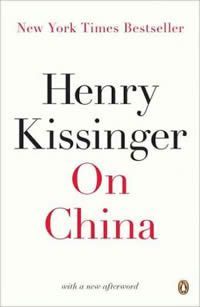On China
 "Fascinating, shrewd . . . The book deftly traces the rhythms and patterns of Chinese history." —Michiko Kakutani, The New York Times. In this sweeping and insightful history, Henry Kissinger turns for the first time at book length to a country he has known intimately for decades and whose
modern relations with the West he helped shape.
"Fascinating, shrewd . . . The book deftly traces the rhythms and patterns of Chinese history." —Michiko Kakutani, The New York Times. In this sweeping and insightful history, Henry Kissinger turns for the first time at book length to a country he has known intimately for decades and whose
modern relations with the West he helped shape.
On China illuminates the inner workings of Chinese diplomacy during such pivotal events as the initial encounters between China and tight line modern European powers, the formation and breakdown
of the Sino-Soviet alliance, the Korean War, and Richard Nixon’s historic trip to Beijing. With a new final chapter on the emerging superpower’s twenty-first-century role in global politics and
economics, On China provides historical perspective on Chinese foreign affairs from one of the premier statesmen of our time.
Author : Henry Kissinger
ISBN-13 : 9780143121312
Publisher : Penguin Group (USA) Incorporated
Publication date : 24/04/2012
Editorial Reviews
Michiko Kakutani
Mr. Kissinger's fascinating, shrewd and sometimes perverse new book, On China, not only addresses the central
role he played in Nixon's opening to China but also tries to show how the history of China, both ancient and more recent, has shaped its foreign policy and attitudes toward the West. While this
volume is indebted to the pioneering scholarship of historians like Jonathan D. Spence, its portrait of China is informed by Mr. Kissinger's intimate firsthand knowledge of several generations of Chinese leaders. —The New York Times
Brantly Womack
On China is former secretary of state Henry Kissinger's attempt to explain Chinese diplomacy to an American
audience, to review the course of U.S.-China relations, and briefly but incisively to address the challenge of sustaining a mutually beneficial interaction. It adds an honorable two inches to the
diplomat's already broad shelf of works.—The Washington Post
Publishers Weekly
In this canny, engaging historical study, the ex-secretary of state examines China's foreign policy for insights into its statecraft and soul. Kissinger (Crisis) recaps China's geo-strategic wei qi match—his ubiquitous metaphor for the subtle positioning
characteristic of the national board game—from the Korean War to today's trade disputes, emphasizing the relationship with the U.S. as it moved from bitter enmity to cordial interdependence. He
grounds his narrative in a penetrating analysis of age-old features of Chinese policy, emphasizing the Middle Kingdom's hauteur, wariness of encirclement—to the Chinese, he argues, America is
just another barbarian horde to manipulate—and dread of domestic disorder. As an architect of Nixon's opening to China and a freelance go-between for later administrations, Kissinger is a major figure in the story, and the text often revolves around exegeses of his cryptic dialogues with
Chinese leaders. The book therefore oozes Kissingerian realism, with its stress on great power machinations, international balance, and high-stakes summitry and its impatience with human rights
strictures; a deadpan wit and cold-blooded candor flash out from clouds of diplomatic euphemism. Though it sometimes feels like a mind game between mandarins of many stripes, and Kissinger's generalizations about Chinese national character can also sound outmoded, this insider's account sheds a
revealing light on the contours of Chinese-American relations. (May)
Library Journal
Originally scheduled for November 2010 and featured in Prepub Exploded of June 3, this study of China past, present, and future—especially in terms of Kissinger himself—has been bumped to May 2011. An aggressive media campaign is promised.
Kirkus Reviews
From the eminent elder statesman, an astute appraisal on Chinese diplomacy from ancient times to thefraught present "strategic trust" with the United States.
Former Secretary of State Kissinger (Crisis : The Anatomy of Two Major Foreign Policy Crises: Based on the
Record of Henry Kissinger's Hitherto Secret Telephone Conversations, 2003, etc.) brings his considerable
scholarly knowledge and professional expertise to this chronicle of the complicated evolution and precarious future of Chinese diplomacy with the West. Traditionally, Chinese foreign policy as
practiced by centuries of emperors was marked by appeasement and generally overwhelming their barbarian enemies with Chinese largesse: the "five baits" included clothing, music, slaves and food
to "corrupt" the opponent into seeing things the Chinese way. In their supreme self-containment, the Chinese disdained the importunate advances of the barbarians until the aggressive incursions
by the West to force open the barriers to trade in the late 18th century.
Foreign threats by the West, Russia and Japan and the series of "unequal treaties" imposed on China impelled it into a period of "self-strengthening" that was finally achieved by the Communist
consolidation of power under Mao. From Mao's declaration in 1949 that the Chinese people "have stood up," the Chinese practiced a modern form of pursuing the "psychological advantage," rather
than the military (shades of Sun Tzu), in confronting the superpowers. However, a new era commenced under Deng Xiaoping, who was bent on reform and open to travel and new ideas, and normalization
of relations with America was finally established under President Carter. Kissinger wisely considers Tiananmen,
Taiwan, the elevation of Jiang Zemin and the new era of "cooperative coexistence" maintained by President Hu Jintao. The author warns, however, that despite China's commitment to a "peaceful
rise," the U.S.-China relationship will continue to contain an underlying tension.
Sage words and critical perspective lent by a significant participant in historical events.
Meet the Author
Henry Kissinger served as National Security Advisor and then Secretary of State under Richard Nixon and Gerald Ford. He
received the 1973 Nobel Peace Prize, the Presidential Medal of Freedom, and the Medal of Liberty, among other awards.
